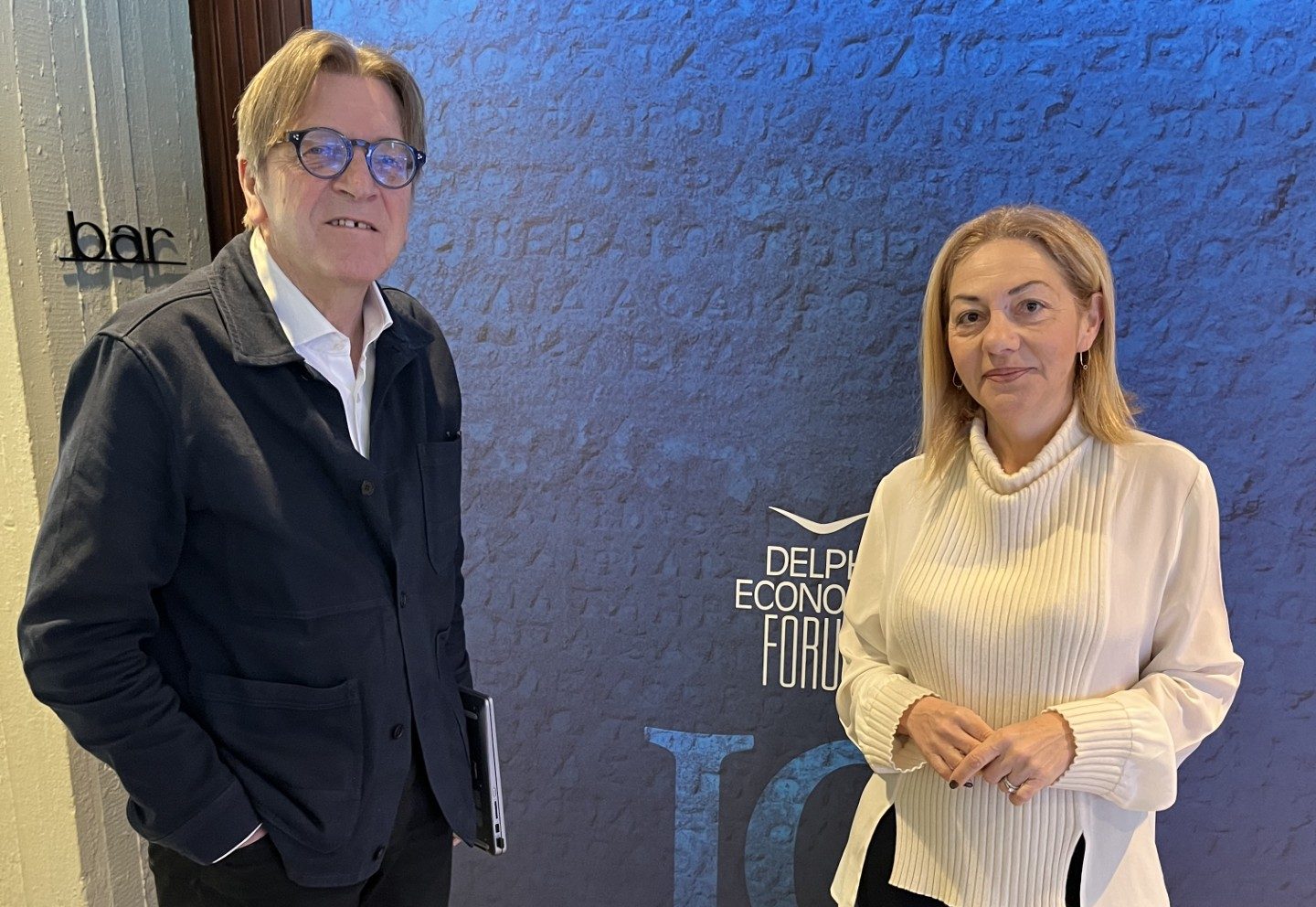Verhofstadt highlights the urgency of fostering true European unity in a world increasingly dominated by competing global powers, from the U.S. to Russia and China. Verhofstadt argues that without substantial political, economic, and technological transformation, Europe risks falling behind. He critiques the lack of vision in the world’s current political leadership, pointing out the rise of populism and the collapse of trust in liberal democracy. In an era marked by inequality, migration crises, and the shifting balance of power, he calls for bold, future-oriented policies to reclaim hope and direction for Europe. This interview offers a powerful critique of the present political landscape and constitutes a call to action for Europe’s leaders: act decisively or face irrelevance on the global stage.
Has the moment of truth come for Europe?
The stakes have never been higher for Europe, and yet there is a sense of uncertainty over whether the continent can act decisively. “It’s now or never,” says Guy Verhofstadt, who believes that in today’s brutal geopolitical world—dominated by empires and an unpredictable American ally—Europe must unite or risk being left behind. He underscores the urgent need for military and defense cooperation, the completion of the single market, and a technological revolution to make Europe competitive in the digital age. As it stands, the EU remains marginal in the tech world, with American and Asian giants dominating the platform economy. Verhofstadt stresses that Europe’s future depends on a complete overhaul in these areas—yet, trade agreements like Mercosur and CETA remain unapproved or unimplemented, highlighting Europe’s inability to act effectively. “So how you can continue with, for example, Orban around the table, who is in fact an ally of Putin?
“It would be good if the Commission, with the support of the new German Chancellor and Macron, come forward with a plan. And if it cannot be done with all 27, let’s do it with those who want to go forward.”
Q: You also speak about the difficulty of moving forward with all 27 EU member states. Do you think it’s even possible for Europe to progress as a whole?
“You could easily say, yeah, these 20 countries want to go forward, so we make a treaty with these 20. You know, that’s the way it works in politics. The Americans did it like that in the 18th century. The political mechanism to do that hasn’t changed. So that’s needed. And my fear is that there is still not a willingness within the Union to do it. First Macron went to Trump, now it’s Meloni who’s going to Trump, and tomorrow I don’t know who. So you see that it’s time they sit down together and say, okay, that’s the way forward for the continent. And if they don’t do it now, then we will suffer from every direction: from the Trump administration, from autocratic Putin. And from a fight, a trade war, between China and the U.S.
Q: We’re seeing a rise of far-right parties in Europe, similar to what happened with Trump in the US. What’s happening to liberal democracy?
There’s something wrong with politics in general and liberal democracy. There is something wrong, and it’s not hard to find out what. By the way, I’m writing a book about this. It has to come out in a few months from now, before the summer break. I want to publish it in America, because if you talk about the crisis of liberal democracy, two-thirds of your examples today are about the US, with a little bit about the UK and other countries. Mainly, though, if you are looking at the decline of liberal democracy, you go to the other side of the Atlantic. The same thing is happening in every society, but on a smaller, less visible scale. But liberal democracy is in crisis everywhere.
As it works now, liberal democracy is seen by a huge part of the public purely as a political system which exists to help elites get rich, not to help people in general. And that is exactly what is happening in the US. The result: the American middle class, who were the backbone of the Democratic Party, is now a voting machine for Trump.
There has been a complete shift in party affiliation in the US. And it’s the same in Britain, where you’re going to see who Labour’s big enemy actually is. It’s not the Conservatives, it’s Reform that is taking Britain’s middle-class and working-class votes. Which means that liberal democracy is no longer seen as an alternative. Why? Because the politics of liberal democracy have become pure and boring pragmatism. There is no ideology anymore. No centrist politician anywhere has a big vision for the future. But politics in the center hasn’t only become boring; it also fails to give the people direction. It has no vision to give, and it no longer generates hope. So all these people in the center are now saying, “There’s a crisis, we’re facing difficulties, who can I follow?” Then they follow the populist, because if there is no hope in the center of politics, which has been starved of oxygen, there is a vacuum of sorts which sucks in populism of all types, from the right and from the left. So this is the crisis you see in America; this is a crisis you see in Europe, in the UK, and maybe tomorrow in France, too, with the RN etc. And the populists are already in power in a number of countries: the Netherlands, Italy, Hungary, Slovakia. And in 2024, with just one exception, all the elections were won by extreme right-wing populism. Every one! Except for Poland, the right won every election. And they have come in power in some countries. So there is a crisis of democracy. And there is no ideology, no vision that challenges populism. None. Not socialism, because socialism didn’t work. Communism didn’t work. And, apparently, liberalism doesn’t create enough support, either. So there is a vacuum in politics, and that has been completely filled with populist rhetoric.
Q: You say that politics has become “boring” and lacks vision. Why do you think this is happening? Our lives got better with Liberal Democracy and with Socialism—though not with communism, of course.
If you look at the economic growth in Europe and the US since the financial crisis, you will see that we still haven’t recovered from the financial crisis of 2008. And, in the meanwhile, you have other crises, you’ve got a pandemic, you now have the war in Ukraine, and migration—don’t underestimate that as another element. So we have a migration crisis, a health crisis, a political-military crisis with Russia, and a financial-economic crisis that has still not been fully absorbed. All this has come together is an enormous mix of discontent. At the same time, though, we have a political class which lacks the capacity to see the big picture, to create certainty, or propose a genuinely bold, future-oriented vision; a vision that people can get enthusiastic about, in which they can see a direction and hope for the future. Because they don’t just expect politicians to solve the small problems; they want to see direction.
And they get direction from the populists? Why do they believe them?
The populists are different. They don’t need to create a beautiful vision for the future; they can simply exploit all the discontent, fear and anxiety.
They say we’re going to take that away, your fear and your anxiety. Because what the populists do first of all is create this fear and anxiety. For example, I don’t think Hungary has a problem with migration. It doesn’t exist. There are no people coming into the country, but Orban still holds a referendum about it. The result? In the whole of the European Union today, Hungarians are the most fearful and anxious and against migration. So, that’s what populists do: they create the problem, they amplify it.
But then, when the democratic parties come along, the liberal parties, they play the game in the populists’ court. They don’t explain what’s happening with migration. They try to imitate the populist parties and use the same rhetoric.
Look, what politics needs is to get back to a vision, a story which includes migration but isn’t only about migration—it’s also about defense, the world order, the future of Europe, the crisis of capitalism… Because it is a crisis, right? Inequality hasn’t been as big as it is today in a 100 years. And if we have the same inequality figures as we had a century ago, then inequality is the highest it’s been since WWII, or even since the start of the 20th century.
People have the feeling that politics is above their head, elitist, and they have nothing to say. So there is a crisis of democracy, a crisis of capitalism, a crisis of migration, a crisis of this, a crisis of that. And in an environment like that, you need politics that can say “That’s why all this is happening. But we can change and get out of this mess together!” That’s what we need politics to do, but that sort of politics no longer exists.
Why don’t our politicians have vision anymore?
Because we reached the end point of that political vision over the last 20-30 years. Look, even socialists like Blair and Trudeau said “Yeah, there’s no difference between Left and Right anymore, between this and that, between this vision and that vision.” So these people killed the political content themselves. So politics is only about practicalities now. It’s building railways; it’s building roads; it’s filling the hole in social security. It’s not about where the future of our societies lies. But there is something to talk about, certainly for liberals.
And there’s a huge problem with social media. Our democracy has been killed by social media. What is our answer to that? We have none. There is no way we could have an answer in Europe, because we simply copy the features of the Americans—not of the Chinese, fortunately, because that would be worse. And so we find ourselves in an impasse. There is also a lack of ideology in what I call the broad sense. I’m not talking about the old ideologies of communism and socialism. No, by ideology, I mean describing and simultaneously analyzing the picture of society as a whole, while proposing a way forward—and that kind of ideology no longer exists. We have no leadership, either, so what we get is what I call “a supply-side crisis in politics.” And if you don’t supply people with politics, they fall back on the most awful narratives and politics—those of populism.
Is that also connected to the lack of money? Because it seems there isn’t enough money for social security, or for a good public health system.
There has never been as much money in the world as there is now. But it may not be so evenly distributed. There are a lot of really wealthy people in our societies, and I mean a lot! But there is no middle class anymore; the middle class has disappeared. You have a small minority of very lucky, wealthy people, and then all the rest who are fighting to survive. In the past, a blue-collar worker could feed his whole family, buy a house, a car, a television, a fridge, everything. But not today.
No, a house is a dream, even in Greece.
It is becoming more and more difficult. Or, at least, two people need to work in the household. That’s what you see in these inequality figures.
So is a third world war a possibility? Are we in that phase now?
Who knows? With Putin and Trump, it’s completely unpredictable. So one day, I’d say yes and the next day, I’d say no. But the fact that the world is no longer predictable is the crisis facing our world order today. Everything was very predictable during the Cold War. And it remained highly predictable after the fall of the Berlin Wall—which we naively thought meant it was all over. So there was the Death Star problem, and there was that beautiful book by Fukuyama saying that everything was finished; that the war was over, the fight was over, ideology was finished. There’s a free market now, and combined with political democracy everybody will come under that system. We didn’t have to do anything, it would happen spontaneously, because history is like that: unavoidable. And that’s exactly the opposite of what happened. History has continued. And we did nothing. We did nothing in Egypt. We did nothing in Syria. We did nothing in Hong Kong. And tomorrow we may do nothing in Taiwan, either.



